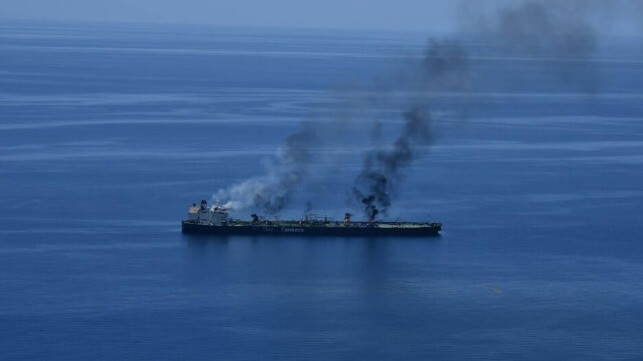Pentagon: Sounion Appears to Be Leaking After Houthis Threatened Salvors

Officials at the U.S. Pentagon told reporters that they believe the Greek-owned tanker Sounion is leaking oil in the Red Sea but declined to comment on what could be done to avert an environmental disaster. Speaking to reporters the spokesperson said they were aware of threats made by the Houthi against a possible salvage effort although they did not specify if that was before or after the vessel was set on fire.
“The MV Sounion now sits immobilized in the Red Sea, where it is currently on fire and appears to be leaking oil, presenting both a navigational hazard and a potential environmental catastrophe,” said Pentagon Press Secretary Major General Pat Ryder during a press briefing on Tuesday. “These are simply reckless acts of terrorism which continue to destabilize global and regional commerce, put the lives of innocent civilian mariners at risk, and imperil the vibrant maritime ecosystem in the Red Sea and Gulf of Aden, the Houthis own backyard.”
The Pentagon’s assertion that the tanker is leaking follows similar statements circulating online and multiple satellite pictures. The tanker is carrying 150,000 tons (roughly 900,000 barrels of Iraqi crude) with EUNAVOR Aspides saying observers believed five fires were burning. Aspides yesterday said it had not seen evidence of a major leak while also warning of the significant dangers to the region.
Greek-Flagged Oil Tanker Targeted by Houthis Still Ablaze, According to Sanad's Satellite Image Analysis
— Khaled Attia (@kh_attia) August 27, 2024
????? Satellite images captured on August 25 show that the fire on the Greek-flagged oil tanker SOUNION continues to burn following its attack on August 21.
?? The Houthis… pic.twitter.com/kRdRzoZPjD
Asked by reporters about the situation and if the U.S. or allies were doing anything to stop the fires or address the current condition, Ryder was vague on what might be done. He only said, U.S. Central Command continues to “monitor and assess the situation.” Operator Delta Tankers is also declining to comment citing safety concerns.
“We are aware of a third party that attempted to send two tugs to the vessel to help salvage, but they were warned away by the Houthis and threatened with being attacked, which again demonstrates their blatant disregard for not only human life but also for the potential environmental catastrophe that this presents,” Ryder said in response to a reporter’s question.
EUNAVFOR’s pictures clearly showed the bridge destroyed by the Houthis as part of the attacks after the vessel was abandoned in a further attempt to disable the ship. EUNAVFOR reported the fires for the attack had appeared to have been extinguished when the vessel was abandoned but that it was disabled and unable to navigate.
#BREAKING
— ???? ???????????????????????????????? ???????????????? (@cheguwera) August 27, 2024
The crew of the #Sounion tanker released videos of the moments after the USV attack and the #Yemen missile hit the vessel. Missile and USV attacks resulted in the ship's engine failure and the crew had to call for help from the #EuropeanUnion fleet and eventually… pic.twitter.com/hv05s3x2aG
Officials from the government of Yemen are also speaking out highlighting the danger of the vessel sinking or exploring just 85 nautical miles from Hudaydah in the Red Sea.

that matters most
Get the latest maritime news delivered to your inbox daily.
“Any oil spill in the Red Sea, Bab al-Mandab Strait, and the Gulf of Aden threatens Yemeni fishing stocks, will affect millions of Yemenis in coastal cities with toxic gases, will stop the work of Yemeni ports, will pollute Red Sea desalination plants, and cut off their supplies,” said Moammar Al-Eryani, Minister of Information, Culture and Tourism for the Republic of Yemen. “Yemen will lose fisheries that provide a livelihood for 1.7 million Yemeni citizens, and will destroy the biodiversity and ecosystem in the region.”
His dire warnings are similar to those issues by the United Nations more than two years ago when it was organizing the effort to transfer oil from the FSO Safer. They had predicted if the Safer failed and released a similar amount of oil to that on the Sounion it would take 25 years for the region to recover. The UN put a price tag of $20 billion on the cleanup while saying it would interrupt shipping in the Red Sea for an extended period, costing billions of dollars per day.
